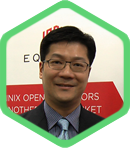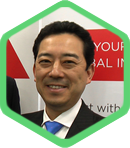Introduction to Companies in Osaka
Interviews
Equinix, Inc.
Interviews with foreign investors in Osaka 2013.12.05

Equinix Asia-Pacific

Equinix Japan
QPlease introduce your company.
[Samuel Lee] We are a global company. Actually, we are a very focused company. We are an internet connection and global data center company. We have 100 data centers in 16 markets and 5 continents around the world. And we are very focused. We do two things. First, we provide very high-quality and reliable data center space for our customers to host their mission-critical and latency-sensitive applications. Second thing, we help our customers to connect to the backbone of the internet, or connect with each other, inside our data center. And one thing is that we call our data centers IBX -- International Business Exchange -- as this is the name that implies that we want our customers inside our data centers to do business together, and Equinix is just like a marketplace to facilitate transactions and business exchange. Today, this Osaka facility is our 100th data center around the whole world. So we are in a pretty unique position, in that it is very hard to find another company like Equinix with such a big global footprint, focus on network density, and helping our customers to solve their business issues like latency issues, and how to expand their business globally.
QPlease introduce the company and yourself.
[Samuel Lee] I started my journey with Equinix 14 years ago. When I joined this company, it was actually very interesting. We didn't have much. We only had a few pages of business plan, and we needed to go out to ask for people to give us funding to build our business plan. So, as you can imagine, I went through like a roller coaster. During the year 2000, we got the money, then the dot-com bubble burst, and then suddenly we had a difficult time, and then later on we experienced SARS, which hit Asia very hard, especially Hong Kong and Singapore. It affected our business, and just one day when I woke up, we had become the world's leading provider - the last man standing in the marketplace, and then we are the world's number one carrier-neutral provider. It was a very interesting experience for myself and for my team, and I still wake up every day very excited about our business.
[Kei Furuta] I joined Equinix about four years ago -- It has been a very interesting journey. The company is growing very fast. We’re very focused, very dedicated to each of the markets, and with some interesting progress in Japan. Ultimately, this is what brought us to Osaka this year. And in a very interesting, various ways, Equinix, I believe, is a unique company, and we are on one side, very focused, but as we are growing, we still seem to be conservative on the other side. So, we spent like two years to study about the Osaka market, and ultimately made the decision to come here, which is presently the 100th data center in the whole world, which is a good sign of a lucky and successful development here.
[Samuel Lee] When I got promoted to be the head of Asia-Pacific at the end of year 2005, the Asia-Pacific region only had about 20 million revenue. Last year, (public record), we had 300 million in revenue. So, from year 2006 to now, we grew more than 10 times, just in Asia.
QPlease introduce new facility in Osaka (OS1).
[Kei Furuta] We are now in the new Osaka facility here, and you only see some of the signs, but we are in the middle of the city of Osaka. And the reason we chose Osaka downtown was because we wanted the facility to bring the networks and the telecommunication companies to access to this location. And I believe this location is -- we went through all around the city, from the north, to the south, to the east, and maybe the west it would be the ocean -- but it would be all around. And we believe that with the partnership with Keihanshin Building and also the unique location we selected the right place to actually make the business model for Equinix work, which is that we want -- we cannot do that in the mountain, so it has to be in the right place, and we believe we selected the right location.
[Kei Furuta] We are very focused on -- we have a very limited number of services, and we are basically doing the same thing in every market in the world, so what you can get in Osaka is exactly the same thing you can get in New York, or Washington or Hong Kong or Singapore.
QHow Osaka will change after opening Equinix Osaka (OS1)?
[Kei Furuta] I think what we can bring to the market is more presence of global companies. Global companies in the digital economy, like the search companies or content companies or financial institutions, that need the coverage in both Tokyo and Osaka, and for them, we could facilitate to enter this market. That's the first thing we can bring as value and contribution to the market. And the second point would be also be to facilitate the Japanese global companies who are headquartered or located in the Osaka region to go more global, to go to other countries. So those are the two things that we could bring to the market.
QWhy did you choose Osaka?
[Kei Furuta] Well, Japan is a big market. In general. Japan as a whole, has a large economy & a large market for IT & data centers, and also content, plus for many of our customers. And it is natural to have multiple locations in one country to serve the entire nation. And the reason we chose Osaka is pretty natural, that if we have already presence in Tokyo, the second location we want to have in Japan would be Osaka. And there are a couple reasons about having multiple locations: one is for risk control and for security reasons, well, BCP or disaster recovery or so on, but choosing Osaka is not exactly only for that purpose. Because Osaka itself is a big market, and many of our customers need to be close to their end-users. End-users are consumers or it could be businesses. And the second location in Japan is naturally in Osaka.
[Samuel Lee] On top of that, whenever Equinix considers a new market, the new market needs to hit certain criteria. First, you need to be a tier 1 city from an economic point of view, and also from a telecom infrastructure point of view. If you look at the economy of Osaka as Kei pointed out this is a very big market for everyone. On the telecom, infrastructure-wise, this is a very sophisticated method. Talking about local access, internet connection, submarine cable access, it's a very mature market. So it hit those criteria, and this is an environment, that welcomes foreign investment. It is very important to our customer base, as well.
QHow is the collaboration with companies in Osaka?
[Kei Furuta] Well, the reason we started the conversation with K-Opticom first. K-Opticom is the largest access network provider in the market. So, naturally, we started some conversation to work together. And they agreed with the carrier neutrality concept, and they agreed to the necessity to have more global companies in the market, so we decided to work together on our expansion. And KENES, Kansai Energy Solutions was originally brought to the conversation through K-Opticom, which is in the same capital group, Kansai Electric Group. And we had a few conversations and we thought it's a good idea to use KENES' expertise in building a qualified data center facility in Osaka. We are familiar with the market, construction market, and engineering market in Tokyo, but not that familiar for being based here. So, to use their expertise, it was the main reason to work with them.
[Samuel Lee] Usually, there are a few options when you look at a new market. Either you go on your own, or you find some partnership like we’re doing in Osaka, or you really go into a JV, or the last one is an M&A. So, we don't have very hard rules about which one we want to do. It really depends on the market conditions.
[Kei Furuta] The market is a very sophisticated market. The business and economy is very big. And we needed someone to help us to really get into the market, so we can avoid the time to learn about the market. So I think it's been a good decision for us to make.
QHow was the support from local governments and O-BIC?
[Kei Furuta] Well, I think the other part I should touch on how we decided about market entry was, again, the support by the local government, especially we had multiple meetings with the City of Osaka, and also who brought the prefectural government together. And I see the change, or difference, between other cities in Japan, how the local governments are trying to be supportive to bring global economy or global companies to the market. And I would say it's been very helpful. So throughout the entire process, the support of the local government was very important.
[Samuel Lee] You make us feel welcome. It's very important, because it's a new market. Not only do we need to invest money, but it's time and resources of the company, and the management bandwidth we have. And we feel very comfortable to invest here, because we feel we are welcomed by the government to come here and do business. It's very important to us, and thank you for your support.
QWould you give some messages for foreign companies?
[Samuel Lee] I think Japan is quite a different market than the rest of the world. Especially, it's different than the American market, or Europe, or even the rest of the Asian countries, because you have a unique culture, a unique business practice, so when global companies come to this market, I think it's important to spend some time to learn the market, build relationships, and like our model, I think partnerships with some local players can really help and speed up the learning process. So I would encourage global companies when they want to come to this market, to try to build local relationships first, instead of just coming in and doing everything by yourself. So it will definitely help. For Osaka, I think it makes total sense, because nowadays, most of the global customers or global enterprises are very concerned about business continuity and disaster recovery. So, especially for a big market like Japan, it's a very important market for most of the global companies, so having a diversified strategy, & having both Tokyo and Osaka as active sites is very important in terms of BCP, so I think most companies should consider this strategy.
[Kei Furuta] Yeah. I think Equinix has been in the Japan market since the year 2000, which means we are already here 13 years. And that's a very long history for an American company. And there have been a lot of lessons learned as a company, and that expertise still exists in the way we are practicing business in this market. And for the foreign companies or global companies considering entering Japan, that's the expertise we can share with them. And as Samuel said, it's a pretty unique market. And bridging the uniqueness across the globe is actually part of my responsibility.
| Equinix, Inc. | |
|---|---|
| Establishment | 1998 |
| Home Base | California, USA |
| Parent Company | Equinix, Inc. |
| Business | Operation of International Business Exchange™ (IBX®) data centers |
| URL | http://www.equinix.com/ |